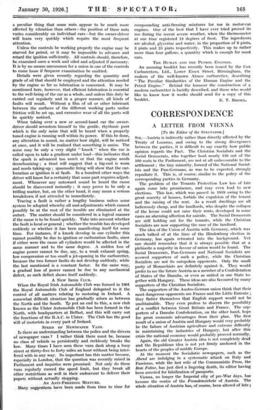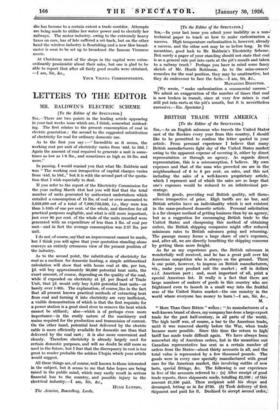CORRESPONDENCE
A LETTER FROM VIENNA
[To the Editor of the SPECTATOR.]
Sia,—Austria is indirectly rather than directly affected by the Treaty of Locarno, and owing to the strong divergences between the parties, it is difficult to say exactly how public opinion regards the Pact. The Christian Socialists and the Social Democrats, who together hold nearly 150 out of the 160 seats in the Parliament, are not at all unfavourable to the settlement ; the tiny minority, formed of the National Social- ists and the Pan-Germans, as was to be expected, strongly repudiate it. This is, of course, similar to the policy of the corresponding parties in Germany.
The problem of the Tenants Protection Law has of late again come into prominence, and may even lead to new elections. This law, which was passed in 1919 owing to the great scarcity of houses, forbids the expulsion of the tenant and the raising of the rent. As a result dwellings are all, ludicrously cheap, and the landlords, who despite the collapse of the krone could not raise their rents, developed in some cases an alarming affection for suicide. The Social Democrats are still holding out for the tenants, while the Christian Socialists are now supporting the case of the landlord.
The idea of the Union of Austria with Germany, which was much talked of at the time of the Hindenburg election in Germany, has again retreated into the background. Yet one should remember that it is always possible that at a plebiscite a majority in favour of union would be found. The Social Democrats, Pan-Germans and National Socialists are avowed supporters of such a policy, while the Christian Socialists are not its outspoken opponents. Only the small party of Monarchists are definitely against it. They would prefer to see the future Austria as a member of a Confederation of States of the Danube, or even as united in one State to- gether with Hungary. These ideas are also favoured by many supporters of the Christian Socialists.
The supporters of the Austro-German union think that their most dangerous opponents are France and the Little Entente ; they flatter themselves that English support would not be unobtainable. They even profess to discern the possibility of a conflict. between Great Britain and France. The sup- porters of a Danube Confederation, on the other hand, hope for great economic advantages from their plan. The first result of a union of Austria and Hungary would very probably be the failure of Austrian agriculture and extreme difficulty in maintaining the industries of Hungary, but after this crisis the national economy would probably proceed normally.
Again, the old Greater Austria idea is not completely dead and the Republican idea is not yet firmly anchored in the hearts of the peoples of middle Europe. At the moment the Socialistic newspapers, such as the Abend are indulging in a systematic attack on Italy and Fascisrno, while the last relic of the Communistic Press, the Rote Fahne, has just died a lingering death, its editor having been arrested for falsification of passports.
Vienna, no longer the Imperial city of pre-War days, has become the centre of the Premdenverkehr of Austria. The whole situation of Austria has, of course, been altered of late ; she has become to a certain extent a trade corridor. Attempts are being made to utilize her water power and to electrify her railways. The motor industry, owing to the extremely heavy taxes on cars, has of late suffered a set-back, but on the other hand the wireless industry is flourishing and a new 5kw broad- caster is soon to be set up to broadcast the famous Viennese music.
At Christmas most of the shops in the capital were extra- ordinarily pessimistic about their sales, but one is glad to be able to report that after all fairly good results were obtained. —I am, Sir, &c., Yuen. VIENNA CORRESPONDENT.



















































 Previous page
Previous page